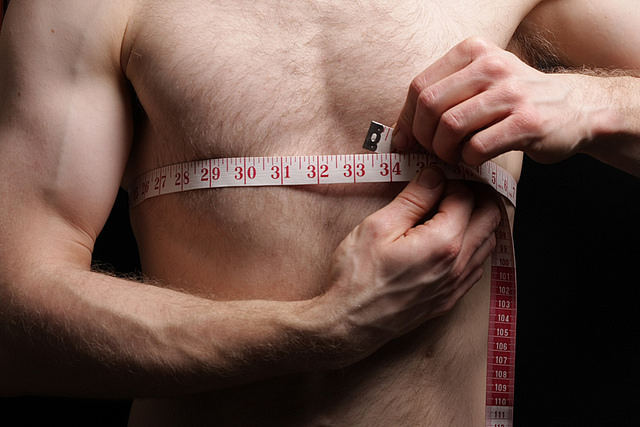Men aspire to be many things. Classrooms, bars, football fields and sidewalks are only a few of the settings in which we loudly perform the characteristics we consider fundamental to our identities: rationality (over emotion), strength, confidence and rugged individualism.
(I’ve omitted many other masculine ideals for the sake of brevity.)
Per these gender codes, it’s unsurprising that men are seldom mentioned in conversations about anorexia nervosa—an eating disorder that compels one to severely restrict his or her eating (in terms of caloric intake and types of food) due to an intense fear of gaining weight.
Symptoms of anorexia include: an obsession with exercise, fixation on nutrition labels, constant thoughts (kept silent or vocalized) about food and diet, anxiety about social functions involving food and apparent unawareness of weight loss.
According to the National Institute of Health, roughly 10 percent of reported anorexia cases come from males. The problem is that anorexia directly clashes with traditional conceptions of manhood itself. A man should recognize the irrationality of those symptoms. He should be strong enough to swallow, bury and defeat his insecurities. He should be confident to the extent that the urge to restrict his eating doesn’t even cross his mind.
It didn’t occur to me that men could suffer from eating disorders of any kind until July 4, 2017, when my family sat me down and told me that I was anorexic. I had been vegan for the seven months prior to that day, and I honestly thought I had been doing it for the right reasons: to reduce my carbon footprint and to take a personal stance against the cruel treatment of farm animals.
It took me a while to accept that I wasn’t acting benevolently when I was vegan. Rather, I was acting responsively—in response to a suffocating fear of getting fat, that is. At my lightest, I weighed somewhere in the ballpark of 135 pounds. I’m nearly 6’3.” You don’t need to be a nutritionist to see that I was dangerously underweight.
That fourth masculine ideal I mentioned—rugged individualism—plays an important part in the story too. Even if a man were to recognize his sickness, to then seek help would make him even less of a man. Men don’t seek help. Men grit their teeth. As such, the thought process goes something like this:
‘You’re weak for feeling these silly insecurities. You’re even weaker for failing to fight them back on your own. What kind of a man are you?’
This brings new meaning to toxic masculinity (arguably a redundant term, but I digress.) The way men—particularly those who are straight and cisgender—conduct themselves is toxic not only in the sense that it oppresses and endangers women; it’s also toxic in the sense that it prevents us from recognizing our insecurities and grappling with them in a healthy way.
I’m going to take it one step further. My susceptibility to masculine ideals not only blinded me to my sickness; it caused my sickness, too. I was so intensely afraid of putting on fat—of failing to have the lean, muscular body that a real, attractive man is supposed to have—that I felt the need to take control of my diet in the most extreme fashion possible.
Think about that. I was so desperate to be a man that I put my physical health at risk. That same desperation kept me from seeing that something was wrong. Quite literally, the pressures of masculinity can be so intense that it becomes dangerous.
I’m not asking you to weep for men—especially not the ones with my complexion and sexual orientation. I’m not trying to divert attention from the struggles of marginalized groups, either.
My aim is simple: to take part in a dialogue about the relationships between masculinity, body image and diet. After all, if such a dialogue can change the ways in which men think and behave, then I think it can, by extension, improve the ways we think about and interact with other groups of people.
My story isn’t the only one. And it’s important to keep a certain word in mind: intersectionality. A person’s experience of anorexia is different depending on his or her race, class, sexual orientation and gender identity.
If you want, you can share your story with me, regardless of how you identify.
Conor Bond is a Collegian contributor and can be reached at [email protected].




















Stephanie Higgins • Sep 13, 2018 at 12:28 pm
Thank you for sharing your story!
Stephanie Strand • Sep 12, 2018 at 2:52 pm
This is such an important topic. I have two young teen boys, and I’ve seen them awaken to the pressure to “not get fat”. I hoped I’d never overhear a child of mine counting calories. It’s very concerning.
I’m so grateful that you are healthy, and that you’re sharing your story.